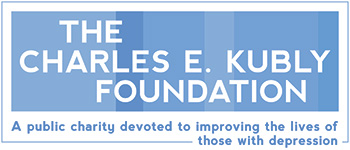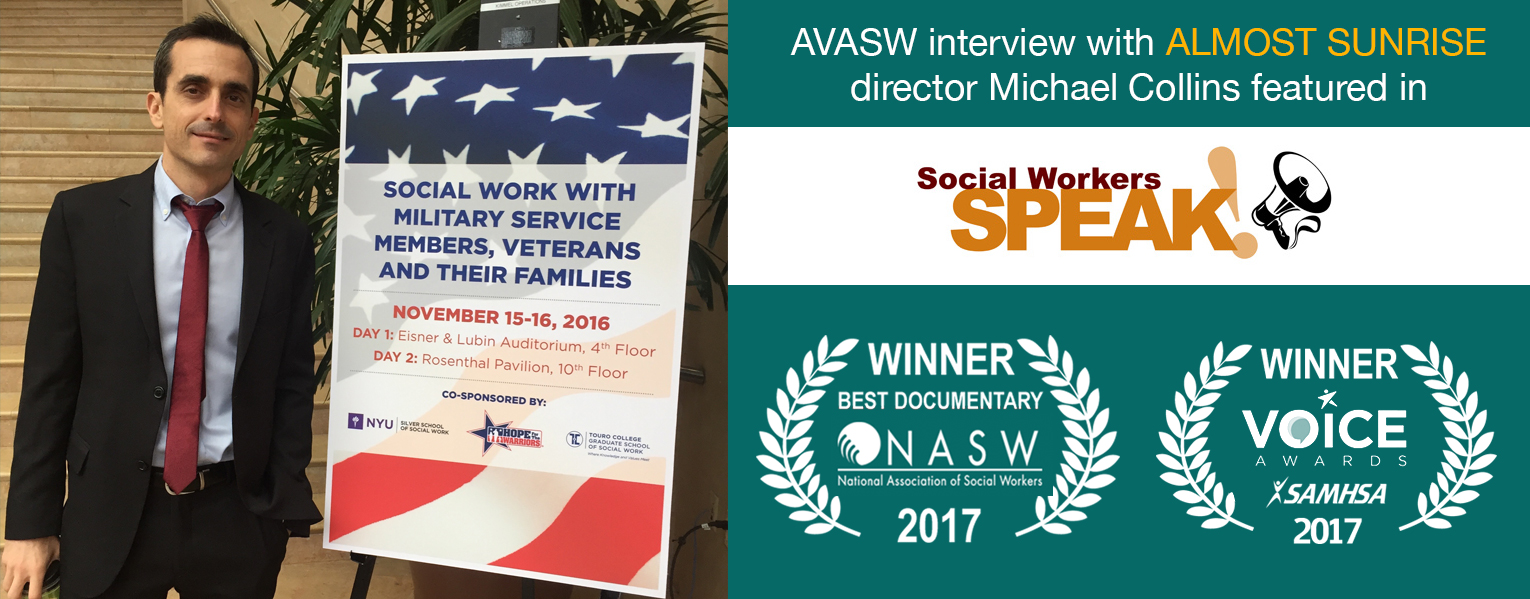AVASW interview with Almost Sunrise director Michael Collins from Spring 2017 Newsletter:
A few months ago, AVASW President Mandy Kalins received an email from a producer for the documentary, Almost Sunrise, looking for a way to connect with VA social workers and high-light this film and bigger mission behind it. This award winning film is about two combat veterans who, diagnosed with severe PTSD, go on a 2,600 mile hike from Milwaukee, WI to Long Beach, CA. Their journey is one of self-discovery and inspiration as they discover peace through meditation and nature. The film also introduces the concept of “moral injury’ and its usefulness in understanding the reality that some veterans face upon returning from war. The film aims to raise awareness for Veteran suicide and encourage Veterans to seek treatment. After viewing the film, Mandy knew that this was something that VA social workers would really connect with and benefit from. Fresh off their recent win as the winner of the 2017 NASW Media Award for Film, Mandy asked the film’s director, Michael Collins a few questions about Almost Sunrise.
Tell us the story about how you came up with the idea for the film.
A few years ago, as part of a video project I’d volunteered for, I had the opportunity to interview veterans and hear about their lives and struggles. One particular day, my I interview subject casually mentioned, “Twenty-two veterans kill themselves every day.” I thought I had misheard. I didn’t. That was a pivotal moment for me in this journey to make this film. I realized right then and there that there was a crisis in this country, taking place right in front of our eyes, one to which many of us, including myself, were blind. In some deep silent corner of that realization, I felt utterly compelled to do something, to act, to serve, to help these people who had sacrificed so much.
Before the film, what did you know about Veterans dealing with PTSD or Moral Injury?
I knew about PTSD from the many documentaries made about the veteran experience and their struggles coming home. Unfortunately these stories are plentiful, and most focus on PTSD, because the reality is many veterans are suffer from severe trauma. But I always knew that I wanted our film to go beyond talking about PTSD; to be looking ahead and starting a new conversation, but I wasn’t sure of exactly how.
It was shortly after the trek began that my cinematographer Clarissa de los Reyes sent me a link to an extraordinary three-fold article by senior war correspondent David Wood on the Huffington Post about “Moral Injury”. It was so eye opening and really helped shape the vision for the film. http://huff.to/2pc0PIr
Moral injury really resonated with me. It was something I could relate to, and I felt that it really spoke to what Tom, Anthony, and their families, were dealing with more accurately than PTSD. I’ve found that it’s one of the most powerful elements of the film for fostering meaningful conversations after screenings from veterans and civilians alike.
With all that you have learned about Veterans, PTSD and Moral Injury, what has been the most surprising or significant part?
The most significant lesson I’ve learned is how much power each of us has to support the healthy transition of veterans into civilian life within our communities, as well as how adjunctive therapies such as meditation and nature-based therapies have a tremendous effect on some of the deepest “wounds.” I’ve heard the unseen wounds a combat veteran returns with de-scribed as “an ordinary response to extraordinary circumstances”, but there has been a tendency to completely medicalize this. Of course there is a need for clinical treatment under some circumstances, but as New York City Commissioner of Veterans Services Loree Sutton recently said after a screening in NYC, “Community is the most powerful medicine.” Watch the video from the NYC event here: https://vimeo.com/213766529
This is why the main pillars of our impact campaign are focused on Connecting Communities and promoting adjunctive therapies and getting them more integrated within the VA sys-tem. We have come to understand that community support can literally save lives. We invite everyone to join our Host a Screening campaign and help foster these connections within their own communities.
After finishing the film and seeing the great impact that is has had on so many, when has there been a moment where you or your team have sat back and said, “Wow! I can’t believe our film did that for someone”?
Recently after a screening event in Syracuse with the Moral Injury Project, a veteran approached Tom (the main subject of the film) and tearfully thanked him and said he now had hope, when he previously thought he was out of options. These moments are common, but don’t always come from veterans. There have been countless individuals who have opened up after the screening and shared how this experience has given them hope, understanding, and made them feel more connected with their community and inspired them into action either on their own journey of healing, or to support others. This is what keeps us energized as a team as we work to get the film out there. We are always trying to find new ways connect with as many audiences as possible because we have seen first-hand the power of these events.
Given that most of our readers are VA social workers, VA social work trainees or retired VA social workers, why should they watch this film and what do you hope that they will take away from it?
We’ve been very fortunate to screen the film with a number of VA providers and it is clear to me that they are as committed to selfless service as veterans themselves. They have shared with us how this film has been powerful to better understand moral injury, the complexity of the veteran experience and the power of adjunctive therapies; giving them more tools to provide each individual with the unique attention they deserve.
Dr. Yvette Branson from New York Harbor VA recently said: “Finally, an honest and real look at the transition our Veterans are making once returning to the Nation. Finally, a conversation between civilians and Veterans that is honest and real in moving us towards healing, not more voyeuristic spinning of wheels. I look forward to sharing this film widely.” You can see Dr. Branson’s full statement here: http://bit.ly/2pfmXDK
For those who view your film who may not be social workers, what are your hopes for them after watching it?
I hope that everyone walks away with a better understanding of the extraordinary sacrifice our soldiers and military families are making to support all of us. More than an understanding in their mind, I hope people walk away with an experience in their heart; feeling connected to the entire com-munity and inspired to take real steps to support one another.
If the sky was the limit, what would you do next on your journey to promote Almost Sunrise?
When we began making this film, we knew from day one we wanted to create a robust impact camping as part of our distribution strategy. We’ve been very fortunate over the past year to connect with hundreds of audiences, partnering with incredible organizations and getting the film and campaign to those who can benefit most.
Each screening in many ways feels like the first one. We’ve been travelling all over the country and partnering with a wide range of organizations, drawing very diverse audiences, and the reactions we hear from audiences continue to inspire me. What makes me so happy is to see that whether it is a veteran, a military family member, a service provider, or a civilian, the film is resonating on a very deep and personal level with so many.
We knew from day one that we wanted the film to be used as a tool for empowering veterans and providing hopeful solutions for moral injury and the suicide crisis. Our wish is to have hundreds more community screenings this year… and that’s why we have launched a “Host a Screening” campaign. Now anyone can work with us to bring the film to their conference, school, organization or community. We’d especially love to get the film in front of more social workers, psychologists and suicide prevention counselors across the country who have been benefitting so much from the screening events.
For more info on how to order the film please click here: https://sunrisedocumentary.com/


